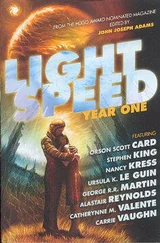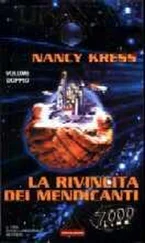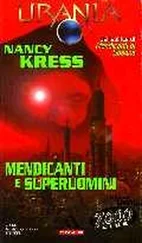“ Lizzie ? Billy? The Livers who came in with me, there were three of them…”
“Dr. Hewitt will be here in a minute.”
“ Lizzie , the little girl, was sick, is she—”
“Dr. Hewitt will be here in a minute.”
He was, with Kenneth Emile Koehler. Immediately my head cleared.
“All right, Dr. Hewitt. What did Huevos Verdes do to me?”
My directness seemed expected. Why not? We’d spent thirty-four days in intimate communion, none of which I could remember. He said, “They injected you with several different kinds of nanotechnology. Some are built from bioengineered organisms, primarily viruses. Some apparently are completely machines, created one atom at a time, that have lodged in your cells. Most seem self-replicating. Some, we guess, are clocked for replication. We have everything under study, trying to determine the exact nature of—”
“What do the machines do ? What’s been changed in my body ?”
“We don’t know yet.”
“You don’t know ?” I heard my own shrillness. I didn’t care.
“Not completely.”
“Lizzie Francy? Billy Washington? Lizzie was sick—”
“A part of the injection you received is the Cell Cleaner mechanism, as you already know. But the rest…” A strange look passed over Hewitt’s face, resentful and yearning. I didn’t want to pursue this look. I was in a sudden frenzy, the kind that makes you think you can’t live through the next five minutes without hearing information that you know you will reject in the five minutes after that.
“Doctor — what do you think this fucking injection will do ?”
His face closed. “We don’t know.”
“But you must know something —”
A ’bot rolled through the door. It was table-shaped, with an unnecessary grille suggesting a smiling face. On its surface was a covered tray. “Lunch for Room 612,” the ’bot said pleasantly. I smelled chicken, rice — the real thing, not soysynth, foods I hadn’t tasted for months. Suddenly I was ravenous.
Everybody watched me eat. They watched with peculiar intensity. I didn’t care. Chicken juices trickled down my chin; rice grains fell from my lips. My teeth tingled with the thick sweetness of ripping meat. Fresh sweet peas, spiced applesauce. I was greedy for food, consumed by what I was consuming. No amount could be enough.
When I had finished, I lay back on the pillows, curiously exhausted. Hewitt and Koehler wore identical expressions, and I couldn’t read either of them. There was a long, pregnant silence — pointlessly so, it seemed to me.
I said, “So now what? When am I going to be arraigned?”
“Not necessary,” Koehler said. His face was still inscrutable. “You’re free to leave.”
My sudden exhaustion just as suddenly departed. This was not how the system worked.
“I’m under arrest for obstructing justice, conspiring to overthrow—”
“Charges have been dropped.” Hewitt this time. It was as if they’d switched roles. Or as if roles no longer mattered. I lay there, thinking about this.
I said slowly, “Let me have a newsholo.”
Koehler repeated Hewitt’s line, tonelessly, “You’re free to go.”
I swung my feet over the sides of the bed. The hospital gown tented shapelessly around me. In big moments, small things matter: the world’s way of keeping us petty. I demanded, “Where are my clothes?” Just as if I wanted the muddy cheap jacks and parka I’d worn to the hospital.
There would be body monitors, of course. Subepidermal homers, radioactive blood markers, who knew what else. I’d never find them.
A ’bot brought me my clothes. I put them on, not caring that the men watched. The usual rules did not apply.
“Lizzie? Billy?”
“They left two days ago. The child is recovered.”
“Where did they go?”
Koehler said, “We do not have that information.” He was lying. His information was closed to me. I was off the government net.
I walked out of the room, expecting to be stopped in the corridor, at the elevator, in the lobby. I walked out the front door. There was absolutely nobody around: nobody crossing from the parking lot, nobody hurrying in to visit a brother or wife or business partner. A ’bot groomed the spring grass, which to my East Oleanta eyes looked aggressively genemod green. The air was soft and warm. Spring sunlight slanted over it, making long late-afternoon shadows. A cherry tree bloomed with fragrant pink flowers. My parka was far too heavy; I took it off and dropped it on the sidewalk.
I walked the length of the building, wondering what I was going to do next. I was genuinely curious, in a detached way that should have alerted me to how quietly and numbly crazed I actually was. Reality could only interest me, not surprise me. Even the interest was precarious. The next step would have been catatonia.
I reached the corner of the building and turned it. A shuttle bus sat there, compact, green as the engineered grass. The door was open. I climbed in.
The bus said, “Credit, please.”
My hands fumbled in the pocket of my jacks. There was a credit chip there: not a Liver meal chip, but donkey credit. I pushed it into the slot. The shuttle said, “Thank you.”
“What name is on that chip?”
“You have exceeded this unit’s language capacity. Destination, please? Civic Plaza, Hotel Scheherazade, loto Hotel, Central Gravrail Station, or Excelsior Square?”
“Central Gravrail Station.”
The shuttle doors closed.
There were people in the station, Livers dressed in bright jacks and a few government donkeys; this was Albany, the state capital. Everybody seemed in a hurry. I walked into the Governor John Thomas Lividini Central Gravrail Cafe. Three men huddled at a corner table, talking intently. The foodbelt had stopped. The holo-grid showed a scooter race, and none of the men looked up when I changed it to a donkey news channel.
“—continues to spread in the midwestern and southern states. Because the engineered virus can be carried by so many different species of animals and birds, the Centers for Disease Control recommend avoidance of all contact with wildlife. Since the plague is also highly contagious among humans—”
I switched channels.
“—strict embargo on all physical trade, travelers, mail, or other entrance of any object whatsoever into France from North America. As with other nations, French fear of contamination has led to an hysteria that—”
I switched channels.
“—apparently ended. Scientists at Massachusetts Institute of Technology have issued a statement that the duragem dissembler’s clocked nanomachanisms have not run their programmed course, but rather have failed over time because of faulty understanding of the complex scope of their construction. Department of Engineering Chairman Myron Aaron White spoke with us at his office in the—”
I switched channels.
“—chronic food shortages. The situation, however, is expected to ease now that the so-called duragem dissembler crisis has slowed, apparently due to—”
I watched for an hour. Famine was easing; famine was increasing. The engineered plague was spreading; the engineered plague had been checked. The rest of the world had been infected by American goods and travelers; the rest of the world showed only minor signs of either duragem contamination or the “wildlife plague.” There was less breakdown from the duragem dissemblers; there was more breakdown in some areas, but scientists were close to a solution to the problem, which was actually difficult to understand because of the advanced nature of the science, for which experts were on the verge of a major breakthrough. Albany was Albany.
Читать дальше










